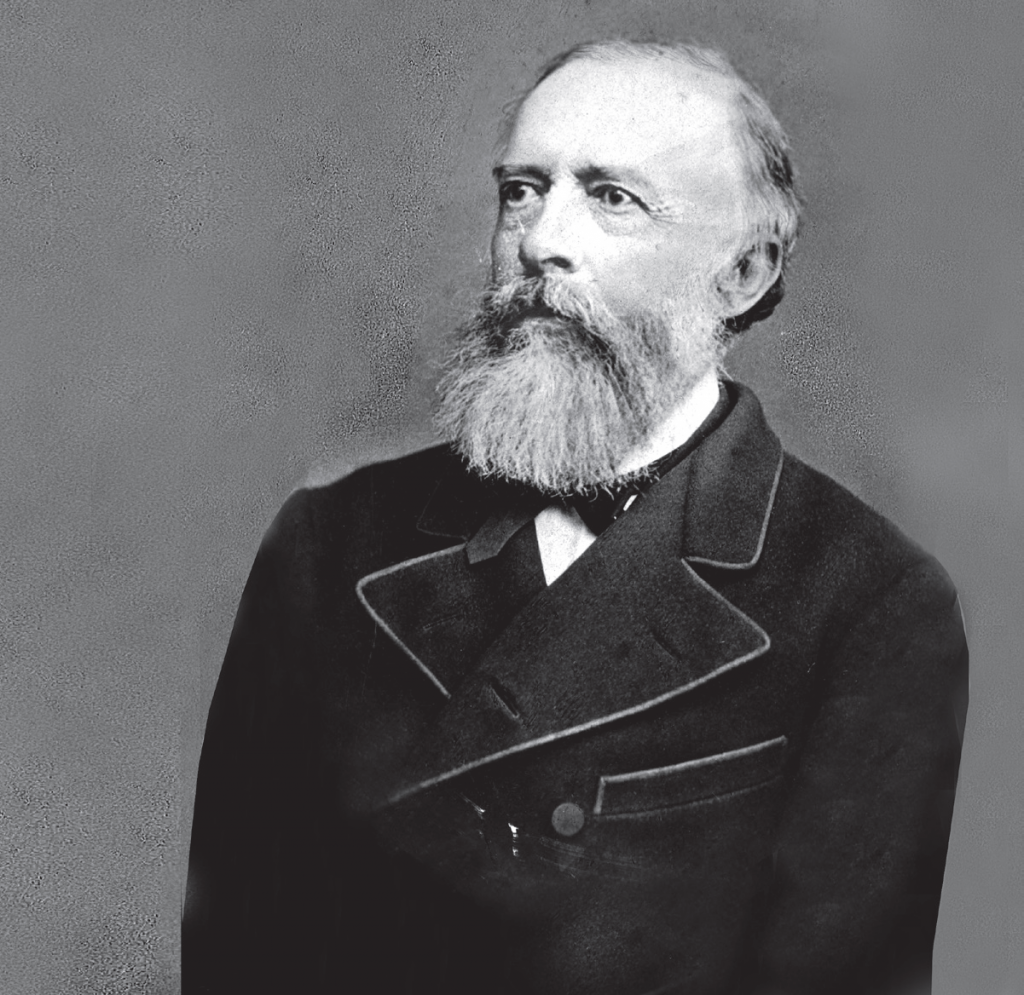Tytus Trzecieski (1811–1878) – persistent black gold seeker

“Any man who ever had an opportunity of closer contact with the late Tytus Trzecieski, who left us on December 24, 1878 after a long and painful illness, must have felt that they were dealing with one of those exceptional personages, infinitely virtuous and benevolent by nature, destined to preserve the moral tradition of impeccable landed gentry and cultivating it according to the demands of the hardships that the present day is replete with. ”
A would-be insurgent, diligent manager
Tytus, or rather Teofil Tytus Tomasz, was born in 1811 in Bażanówka near Sanok. Tytus’ father – Jan Trzecieski, the owner of eight villages in the vicinity of Krosno and Gorlice – ensured for his family prosperity and stable position. Tytus spent his childhood on the estate in Polanka near Krosno. As a son of a wealthy landowner he took his first studies at home, then left for Lviv. At the University of Lviv (being a Franciscan school at that time), he completed the philosophy course, “for a lifetime of noble zeal for everything that is beautiful and exalted. ”
At the beginning of 1831, together with his friends he abandoned education and decided to join the uprising that had continued since November of the previous year. On his way from Lwów to the Kingdom, he visited his home town of Polanka, where he met his parents who allowed only one of their sons to leave and participate in the uprising – the elder brother Franciszek, a law student at the University of Vienna.
Meanwhile Tytus, without having realised his patriotic impulse, threw himself into work on his parents’ estate. Personal supervision of the farm and conscientious work (including physical work) made him a pioneer of organic work. Having been appreciated by his parents, he was entrusted with one of the folwarks (manor farms). He committed himself to multiplying the income with considerable energy. From an early age he was of rather poor health, and strenuous work burdened his body even more, which probably contributed to him coming down with typhus infection. The disease was severe, and in consequence it permanently damaged Trzecieski’s hearing.
Independent entrepreneur
In 1834, parents, Jan and Magdalena Trzecieski, decided to move to Lviv, and transfer their estate into the hands of their three children. Tytus received Polanka and Świerzowa, which in the light of the law were to become his property only in 1837, after he had come of age. Tytus decided to use this time to acquire professional knowledge necessary for independent management of the manor farms. He travelled and studied in Leipzig, Berlin, Möglin, Hohenheim. He returned a few years later as a qualified farmer and miner. Using the knowledge he had gained, he attempted to modernise the estate through its industrialisation. In Uście Ruskie he set up glassworks that produced, among others, bottles for Szczawnica mineral water, and so-called hammer mill, or ironworks, called Kalifornia. The income brought by these enterprises amply covered the expenses incurred by running the farms during poor harvest periods.
Galician slaughter
In 1845, in Lviv, Tytus met young and beautiful Anna Węgleńska of Szreniawa coat of arms. They married the same year, and less than a year later they experienced the tragic consequences of the Galician Slaughter. In February 1846, the Trzecielskis were stating at the manor house in Polanka, hosting Wincenty Pol and his family. The peasants from the nearby Odrzykoń attacked the hosts and plundered the court. “The local peasants, who loved him very much, were unable to defend him, they only dressed his wife as a peasant woman, sneaked her away, and put her up in their place.” Tytus and the Pols survived. These events were a serious blow to the Trzecieskis, who sought to improve the standard of living of peasants in their estates and, as one of the first landowners in Galicia, advocated the abolition of serfdom.
Rock oil and a flock of sheep
In 1853 the flock of sheep – a significant source of income for the farm in Polanka – began to be decimated by an epidemic. The folk healer brought over from Bóbrka advised to cover sheep with the black slime, which the local streams abounded in. The treatment brought unexpectedly good results, which prompted Tytus Trzecieski to become more interested in this substance. He began searching for information in scientific literature, and sent samples to chemists from Möglin, Vienna and Paris to ask about its possible application. He also experimented himself – he boiled it, burned, even tried to distil and condense this substance. In the first responses, he read that “the seepage from the rocks – «oleum petri»” was useless. However, he did not give credence to claims about the uselessness of rock oil – a professor of geology Zajsmer clearly stated that this type of liquid can be used for fuel – so he pursued the subject. He obtained a permission from Karol Klobassa, the then owner of Bóbrka, to extract oil. He collected it not only from streams, but also from specially dug out pits. During this period, Trzecieski received the nickname “the slimer”, given to him by local residents. The costs of experiments with rock oil began to significantly burden the Trzecieskis’ budget, which is why Tytus went to Lviv in 1854 to save the household budget.
“Sir, you bring millions with you”
There are several versions of the story of Trzecieski’s meeting with Ignacy Łukasiewicz, but there is no doubt that it took place in Gorlice in 1854 and resulted in the creation of one of the world’s first oil mines. Łukasiewicz, seeing a sample of rock oil brought by Tytus, was to prophetically declare: “Sir, you bring millions with you. This liquid is the future wealth of the country, it is welfare and prosperity for its inhabitants, it is a new source of income for the poor people and a new branch of industry that will bear generous fruit”. It did not take Trzecieski long to talk Łukasiewicz into cooperation. So they called on Karol Klobassa-Zrencki, the owner of Bóbrka forests, with an offer to organise exploration works. Klobassa, not believing too much in the success of the undertaking, granted his consent for 4 years. It was determined that Trzecieski and Łukasiewicz would pay for the use of Klobassa’s land an annual rental payment of 100 guldens, but until 1858 the owner declined to receive remuneration.
Where are those millions? – struggle for survival in the start-up
The beginnings of Łukasiewicz – Trzecieski company (initial capital: 2,400 guldens) were difficult. Mining works which consisted in digging out ditches and wells to increase the efficiency of oil extraction did not yield the expected results for a long time. In 1855, the Wojciech mine yielded an amount of oil that allowed Łukasiewicz to set up his own rock oil distillery (with 3 boilers) in Ulaszowice near Jasło (now a district of Jasło) then belonging to Franciszek Trzecieski (Tytus’ brother). The annual value of the petroleum products sold was only 2,000 guldens, which resulted from a not very fortunate location of the first dug-out shafts in Bóbrka. In 1857, Tytus was struck by personal tragedy: his beloved wife died, leaving him with three young children.
In 1858, an agricultural and industrial exhibition took place in Jasło, where the products of Trzecieski – Łukasiewicz: company caused a sensation:
- pure crude oil from Bóbrka,
- two varieties of kerosene,
- machine oil,
- grease lubricant for cart axles and protection of roofs against decay,
- floor asphalt used in farm buildings,
- “gudryna”, from which paraffin candles could be made.
Despite this success, in 1859, the extraction of oil in Bóbrka decreased. Disappointed, Trzecieski went abroad, and Łukasiewicz – after his daughter’s death – went to Jasło, where he leased a pharmacy, and, without the partner’s assistance, he supervised the mine in Bóbrka. To make matters worse, in 1860 Łukasiewicz’s distillery in Ulaszowice burned down.
Gentlemen’s petroleum company: Trzecieski – Łukasiewicz – Klobassa
Soon, however, Trzecieski returned from abroad, and the owner of Bóbrka, Karol Klobassa, engaged in the search for “black gold”, initially within the company Trzecieski – Klobassa (contribution of 1000 guldens each). When, on April 23, 1861, a rich oil deposit was reached through a new shaft called Wojciech in Bóbrka, Tytus Trzecieski offered the downbeat Łukasiewicz an apartment in his manor house in Polanka. This is where they launched a distillery in which they produced lighting paraffin and mineral oils.
In this way, in 1861, a new company was incorporated :Łukasiewicz – Klobassa – Trzecieski. It was created on the basis of gentlemen’s agreements Trzecieski – Łukasiewicz from 1854 and Trzecieski – Klobassa from 1860. Like the previous ones – it was based on an oral agreement and functioned in such a form for 8 years, until 1868. Klobassa brought to the company the oil-bearing area of Bóbrka, Trzecieski finances, and Łukasiewicz assumed the management of the whole, that is, mining works and distillation of oil. Profits were divided equally into three parts.
The oil company Trzecieski – Łukasiewicz – Klobassa expanded quickly, bringing huge revenues to the shareholders. In 1871, after Trzecieski’s withdrawal from the company, Karol Klobassa became the sole owner of the mine in Bóbrka, and Ignacy Łukasiewicz remained its director.
Profits from the extraction of oil enabled Tytus Trzecieski to increase his estate and philanthropic activities. He died in Polanka in 1878, and rested next to his wife in a cemetery in the nearby Jedlicz.
Inspirations:
- Baraniecka Witkowska Marychna, Teofil Tytus Tomasz Trzecieski, in: „Wiek Nafty” 2009, No. 3 (67) (Zeszyty Naukowo-Historyczne Fundacji Muzeum Przemyślu Naftowego i Gazowniczego im. Ignacego Łukasiewicza).
- Kopalnia Bóbrka (Bóbrka Mine), in: Muzeum Przemysłu Naftowego i Gazowniczego im. Ignacego Łukasiewicza, Bóbrka.
- Kosiek Andrzej, Listopad-grudzień: Trzeciescy – wystawa historyczna (November-December: the Trzecieski family – historical exhibition), Muzeum Podkarpackie w Krośnie 2003.
- Krosno. Studia z dziejów miasta i regionu. (Krosno. Studies in the history of the city and the region) Vol. II (1918–1970), ed. Józef Garbacik, Kraków 1973. Pleśniarska Halina, Związki Tytusa Trzecieskiego z przemysłem naftowym w krośnieńskiem. (Connections of Tytus Trzecieski with the oil industry in Krosno area)
- Szujski Józef, Tytus Trzecieski: wspomnienie pośmiertne (Tytus Trzecieski: posthumous memories), Kraków 1894.
Sources of the photos: Fundacja Muzeum Przemysłu Naftowego i Gazowniczego im. Ignacego Łukasiewicza w Bóbrce

